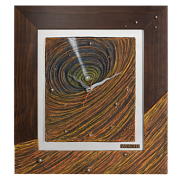Sumo
Sumo (相撲 sumō) is a competitive full-contact sport where a wrestler (rikishi) attempts to force another wrestler out of a circular ring (dohyō) or to touch the ground with anything other than the soles of the feet. The sport originated in Japan, the only country where it is practiced professionally.
Sumo reportedly began as a ritual in Shinto ceremonies to entertain the gods. According to one legend it was originally practiced by the gods and handed down to people 2,000 years ago. According to another legend the Japanese were given the right to rule over the islands of Japan after the god Takemikazuchi won a sumo bout with the leader of a rival tribe.
There are many ancient traditions in sumo, and even today the sport includes many ritual elements: wrestlers sip sacred water and throw purifying salt into the ring before a match; the referee dresses like a Shinto priest, a Shinto shrine hangs over the ring. When wrestlers enter the ring they clap their hands to summon the gods.
Sumo, while considered a martial art, diverges from the typical Eastern style both at the surface and at its heart.
Whereas most martial arts award promotions through time and practice, sumo ranks can be gained and lost every two months in the official tournaments. This divergence from other martial arts creates a high-pressure, high-intensity environment for sumo wrestlers.
Throughout Japan's long and eventful history, sumo has been a valuable part of Japanese culture; whether as a religious ritual, a part of military training, or as a national sport. Sumo has undergone numerous changes, especially from the 15th century to the present.
It has changed in social status, going from a form of entertainment for the Gods, to entertainment for the noble, to entertainment for the masses. The final step was to make it the Japanese national sport in the early 19th century, when it began to develop into what is practiced and recognized today.




